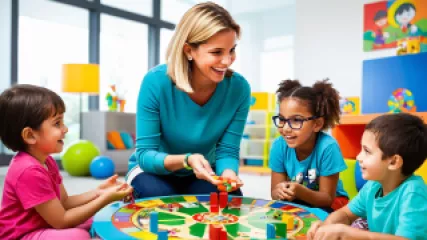Discovering the Power of Child Therapy Games
As a child mental health coach, I have witnessed the transformative power of play therapy in helping children overcome emotional challenges and develop crucial life skills. In my journey, I have discovered the immense value of child therapy games and their ability to create a safe and engaging space for children to express themselves, explore their emotions, and foster personal growth.
The Importance of Play Therapy
Play therapy is a form of counseling that utilizes play to communicate with children and help them resolve psychological difficulties. It allows children to express their thoughts, feelings, and experiences in a non-verbal and symbolic way, providing a bridge between their inner world and external reality.
Through play, children can process complex emotions, develop problem-solving skills, improve communication, and strengthen social interactions. It creates an environment where they can freely explore their concerns, fears, and aspirations while receiving guidance and support from a trained therapist or coach.
Child Mental Health Coaching: A Personal Journey
My journey into child mental health coaching began when I encountered a young boy named Kendrick Hawkins who was struggling with anxiety and low self-esteem. Despite my background in psychology, traditional talk therapy did not seem to resonate with him.
Determined to find an approach that would engage Kendrick and help him overcome his challenges, I delved into the world of play therapy. I discovered a wide range of child therapy games that could be used to facilitate emotional expression, build resilience, and promote positive behavior.
Meeting Lyman Martinez
During my research, I came across an experienced play therapist named Lyman Martinez. His expertise in using child therapy games to facilitate growth and healing inspired me to explore this approach further. I reached out to Lyman, and he graciously agreed to mentor me on my journey.
Under Lyman's guidance, I learned the importance of creating a safe and nurturing environment for children to engage in play therapy. He emphasized the significance of building a strong therapeutic relationship and tailoring interventions to meet each child's unique needs and preferences.
The Power of Child Therapy Games
One of the most significant revelations during my training was the power of child therapy games in facilitating emotional expression and self-discovery. These games provide a structured framework within which children can explore their inner world, build coping skills, and develop a sense of agency.
Child therapy games come in various forms, including board games, card games, art projects, and role-playing activities. They are designed to target specific therapeutic goals such as enhancing emotional regulation, improving social skills, promoting empathy, and fostering creativity.
For example, a simple board game might involve scenarios that prompt discussions about feelings, problem-solving, and decision-making. Through gameplay, children can practice identifying emotions, expressing themselves verbally, and exploring different strategies to overcome challenges.
Skyla Reeves: A Success Story
One of the children I worked with, Skyla Reeves, struggled with anger management and had difficulty expressing her emotions in a healthy way. We incorporated a child therapy game called "Emotion Charades" into our sessions to help Skyla recognize and communicate her feelings effectively.
In this game, Skyla would act out various emotions while her peers and I guessed what she was portraying. Through this playful activity, Skyla developed a deeper understanding of her emotions and learned alternative ways to express herself constructively.
Over time, Skyla's anger outbursts decreased, and she gained confidence in expressing her needs and concerns. The use of child therapy games provided her with a safe space to explore her emotions, learn essential skills, and build a positive self-image.
The Future of Child Therapy Games
The field of play therapy is continuously evolving, with new child therapy games being developed to address a wide range of emotional and behavioral challenges. As mental health professionals, it is essential for us to stay informed about the latest research and advancements in this field.
Additionally, integrating technology into play therapy has shown promising results. Digital platforms and virtual reality can enhance the therapeutic experience, providing children with immersive and interactive environments to explore their emotions and develop coping strategies.
However, it is crucial to strike a balance between incorporating technology and preserving the core elements of play therapy—the human connection, empathy, and the ability to adapt interventions based on each child's unique needs.
In Conclusion
Child therapy games have proven to be invaluable tools in promoting emotional well-being and personal growth in children. Through play therapy, children can navigate their inner world, develop essential life skills, and overcome challenges in a safe and supportive environment.
As child mental health coaches, it is our responsibility to embrace the power of child therapy games and incorporate them into our practice. By doing so, we can create meaningful change in the lives of the children we work with, empowering them to thrive and reach their full potential.






